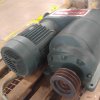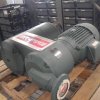kuraki
Fimbulvetr Knifeworks
- Joined
- Jun 17, 2016
- Messages
- 4,679
Has anyone here built their own rotary converter? VFDs are great but I'm spread out enough now that using 1 to power multiple pieces isn't really viable, and it would be rather expensive to put one on every piece I've got.
I got into a really nice TEFC 10hp 3 phase motor. I'm thinking of turning it into a converter, so I could run my surface grinder and hydraulics, and still have power to run my mill or drill presses at the same time to multi-task.
I pass up a lot of screaming deals on 3 phase welders too, which I could likely run just fine with a rotary.
I understand the general principle but get lost in the smaller details like what kind/size of capacitors, switches, how to rig a pony motor, etc.
I got into a really nice TEFC 10hp 3 phase motor. I'm thinking of turning it into a converter, so I could run my surface grinder and hydraulics, and still have power to run my mill or drill presses at the same time to multi-task.
I pass up a lot of screaming deals on 3 phase welders too, which I could likely run just fine with a rotary.
I understand the general principle but get lost in the smaller details like what kind/size of capacitors, switches, how to rig a pony motor, etc.


